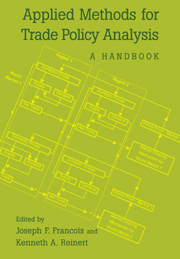Book contents
- Frontmatter
- Contents
- List of Tables
- List of Figures
- Acknowledgements
- List of Contributors
- A Note to Readers
- Dedication
- Part I Introduction
- Part II Basic Frameworks
- Part III Standard Applications
- Part IV Extensions
- 11 Scale Economies and Imperfect Competition
- 12 Capital Accumulation in Applied Trade Models
- 13 Dynamics of Trade Liberalization
- 14 Trade and Labor Market Behavior
- 15 Labor Market Structure and Conduct
- 16 Trade and the Environment
- Author Index
- Subject Index
11 - Scale Economies and Imperfect Competition
Published online by Cambridge University Press: 05 June 2012
- Frontmatter
- Contents
- List of Tables
- List of Figures
- Acknowledgements
- List of Contributors
- A Note to Readers
- Dedication
- Part I Introduction
- Part II Basic Frameworks
- Part III Standard Applications
- Part IV Extensions
- 11 Scale Economies and Imperfect Competition
- 12 Capital Accumulation in Applied Trade Models
- 13 Dynamics of Trade Liberalization
- 14 Trade and Labor Market Behavior
- 15 Labor Market Structure and Conduct
- 16 Trade and the Environment
- Author Index
- Subject Index
Summary
Introduction
The links between trade policy and competition have received intense scrutiny in recent years. Current interest in the policy community follows a long period during which many of the basic tenets of modern industrial organization theory were integrated into the core of mainstream trade theory. A number of empirical studies of commercial policy have attempted to incorporate theoretical insights from this literature into numerical assessments of commercial policy. These include studies of regional integration in North America and Europe (Venables and Smith, 1986, 1989; Cox and Harris, 1985; Francois and Shiells, 1994), studies of national trade policies (de Melo and Tarr, 1992), studies of multi-lateral liberalization (Francois et al., 1994; Haaland and Tollefson, 1994), and sector-focused commercial policy studies (Dixit, 1988; Baldwin and Krugman, 1988a,b).
Over roughly the same period during which trade and industrial organization theory were being integrated, developing countries were grappling with the very real consequences of dramatic changes in their trade orientation and domestic economic structure. Since 1980, developing countries have passed through stabilization and adjustment experiences which rival those of the Organization for Economic Cooperation and Development (OECD) countries at any time since the Second World War. For the most part, closer examination of the vivid and diverse lessons of this experience by mainstream trade economists has just begun. It is therefore somewhat ironic that the new school of trade theorists has until recently focused its attention on developed countries, since nowhere has the link between trade and industry structure and conduct been more apparent in recent times than in developing countries.
- Type
- Chapter
- Information
- Applied Methods for Trade Policy AnalysisA Handbook, pp. 331 - 363Publisher: Cambridge University PressPrint publication year: 1997
- 24
- Cited by



